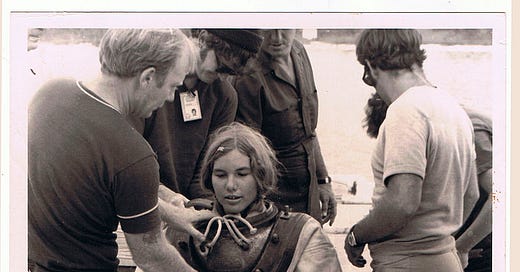Community college was paradise. The cost per credit was $16 and the campus resembled an outlet mall. My classmates included people of all ages, races, creeds, and stages of pregnancy. Due to budget cuts the library was open for about 20 minutes a day and the cafeteria had been requisitioned as a cemetery for deceased furniture, but the school sat beside a creek within sight of Mount Tamalpais. Mornings on campus were cool and pixilated with mist; afternoons hot and redwood-scented.
The quality of instruction was uniformly excellent. Just kidding. My statistics teacher pronounced minus to rhyme with penis (the final nail in my coffin of innumeracy) and all exams were “open book.” One teacher, allegedly of sociology, scrawled an essay prompt on the blackboard each day (What is the true meaning of justice? Support your argument with 5-7 reasons and examples) and then read Us Weekly in silence until time was up. When a lunar eclipse occurred during a night lab, the teacher took us out to observe the sky and tearfully announced that Jesus was coming. “They're saying it's an eclipse,” she said, “but I know He's coming.”
No, it wasn't any of the above that made community college a gleaming citadel. It was a teacher named Mr. Zukas whom I encountered in a class called
”American Literature 1950 to Present.”
Zukas hailed from a (genuine!) university in Europe, exact name and location lost to memory or perhaps never known. Also lost to memory / perhaps never known is the nature of the atrocity he must have committed at his former institution in order to wash up at a California junior college. He had the posture and mustache of a junta leader.
In an act of heroism or hostility or malpractice, Zukas opted not to alter his old syllabi for a new audience of remedial strivers. The first book he assigned was Robert Musil's "The Man Without Qualities," volume one. I assumed this to be a clever winnowing measure. The college catalog was limited to cost-effective lecture classes; seminars were neither offered nor allowed. By hitting students with a brick of Austrian modernism, Zukas caused an efficient purge of everyone except me and two others, a retired couple who brought the room’s median age to 61.
I was wrong, though. It turned out we were actually going to read the impossible Musil, though it was neither American nor 1950-Present. (Later I came to recognize benign insanity as the #1 symptom of a great teacher.)
The major pedagogic innovation of Zukas had to do with homework. He asked us to limit our assigned essays to the length of a single typed page. Anything longer would receive an automatic F grade. He strongly hinted that it would be ideal if we could even contain ourselves to a paragraph.
I thought this policy was very cool. Unlike some of our teachers, Zukas didn’t pretend that he had anything to learn from us. He respected his own time, which encouraged me to respect it. Also, mining a chapter for a paragraph's worth of insight framed the reading in usefully constrained terms. Instead of blundering through 1,200 pages of Musil with terror, I entered quietly and purposefully, like a thin man kayaking through a close passage.
At this point in life I was basically still learning English, so my class notes consisted of vocabulary lists: homiletic, siballine (sp?), syncretism.
After I’d maxed out his class load I found that I was better at reading novels than before but worse at talking about them. Zukas thought that pinning a thesis on a novel was like trying to do the same to a person. Authors and their books were unknowable; the only solution was to navigate the complexity with as much information, sensitivity, and attention as one could muster. I shed the impulse to solve books—or “texts” as he called them, to my urgent arousal at the time—and focused on noticing as much as possible. Naturally, the things I noticed differed from what other people noticed...which was itself interesting.
A related Zukas tenet1 was that good writing produced a higher quantity and quality of misinterpretation than bad writing. You could make a plausible, albeit shitty, argument that the Musil was “really about” sibling rivalry but you couldn't do that about the back of a cereal box.
Obviously there was no literature degree available so I pursued my AA diploma in the subject that seemed closest: Mass Communications. (“What are novels if not a form of mass communication?”) No regrets on that front. Given the instability of today’s media climate, it has always been a comfort knowing that I can fall back on my credentials and get hired as a radiotelegraphy operator.
None of this being original to him—but I didn’t know that at the time, and it makes no difference now!




